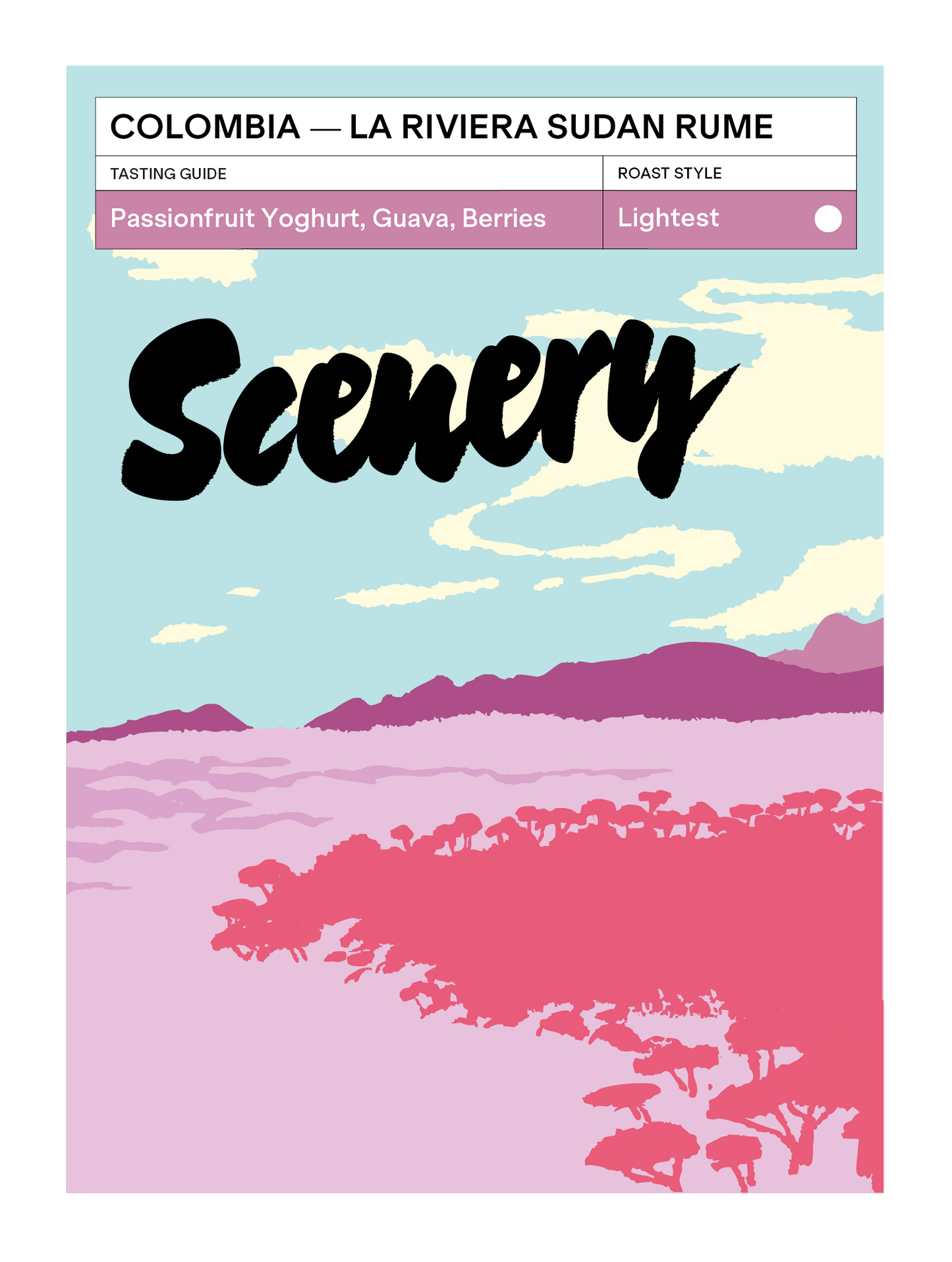



Brew Guide:
Best Brewed with: Filter
Lightest Influence: Fast roasting, shorter development, lower end temp - this level of processing style can present some intense funk when pushed hard, so we're flying as light as we can to present bright aromatics front and centre.
Best Rested: 3-4 weeks
Filter: 62g/L, 96°C when fresh but when well rested you can go down to 93-94°C
Espresso: 18g/48g/23s-26 - turbo-esq shots.
We’re tasting: Full "advanced" process forward aromatics of passionfruit yoghurt & mixed berries. In the cup it's guava rubicon; strawberry gummies and the sweet-sharp acidity of granadilla (yellow passionfruit), alongside mango & honeydew melon. As it cools some of the Sudan Rume spice comes to the fore; like stem ginger & allspice, but as a soft note that never dominates. Lactic and creamy
Traceability
Country of Origin: |
Colombia |
Region: |
Santa Rosa de Cabal Risaralda |
Producer: |
Julio César Madrid |
Farm: |
La Riviera (Cafe UBA) |
Variety: |
Sudan Rume |
Elevation: |
1700 MASL |
Process: |
Washed + Bioreactor: Cherries undergo 24-hour underwater fermentation at 20°C, before pulping. Parchment fermented in a bioreactor with native yeast starter (Kazachstania humilis) for 12 hr fermentation in an anoxic environment. Washed before drying - 8 hrs mechanically before a 24 hr reposado, then solar dried |
Import Partner: |
CATA |
Harvest |
Crop 24/25, Arrived UK November 2024 |
The Story
The Story
Julio César Madrid has been growing coffee across three farms in Risaralda for over four decades, establishing Café UBA in 2014 as his transition from traditional production into the speciality market. La Riviera farm sits at 1,700 metres above sea level in Santa Rosa de Cabal, where the volcanic soils from Los Nevados National Park create ideal conditions for cultivating exotic varieties. The farm specialises in high technical intervention processing alongside growing a diverse range of cultivars, with Madrid working closely with processing expert Andrés Quiceno to refine controlled fermentation protocols that have gained recognition in international competitions.
About five years ago, Madrid adopted bioreactor fermentation technology as part of Café UBA's focus on high technical intervention processing. This represents a significant infrastructure investment in specialised equipment including sealed bioreactors, nitrogen injection systems, and continuous monitoring technology for temperature, pH, and Brix levels. This scientific approach to processing has been validated through collaboration with Universidad de los Andes in 2020, confirming the effectiveness of Madrid's controlled fermentation protocols.
Within the high-tech processing category, Café UBA has achieved notable recognition with their coffees selected by multiple competitors in recent World Barista Championship events, including Mathieu Theis placing 8th in the 2024 championship using their Sidra variety. The operation now spans over 200 hectares across three farms, cultivating more than 20 varieties suited to controlled fermentation protocols.
Sudan Rume has a complex origin story that challenges assumptions about coffee variety lineage. First documented in 1942 by A.S. Thomas in wild state on Sudan's Boma Plateau near the Ethiopian border, this arabica landrace was later confirmed through genetic testing to be an Ethiopian variety with natural resistance to coffee leaf rust and coffee berry disease. Despite being discovered in Sudan, genetic analysis reveals Sudan Rume as one of thousands of unique Ethiopian landrace varieties that evolved naturally in Ethiopia's forests, offering genetic diversity that differs dramatically from the narrow Typica and Bourbon lineages forming the foundation of most global coffee production.
Many of the coffees we have featured have had Sudan Rume as part of their genetic ancestry - in breeding programmes, Sudan Rume serves as the "quality" parent, and is often crossed with hardier/higher yielding varieties to create crosses with hybrid vigour (if F1 generation) - or maintain quality when the breeding program back-crosses to the point of stability (typically F5-F6 onwards).
- Choosing a selection results in a full page refresh.
- Opens in a new window.




